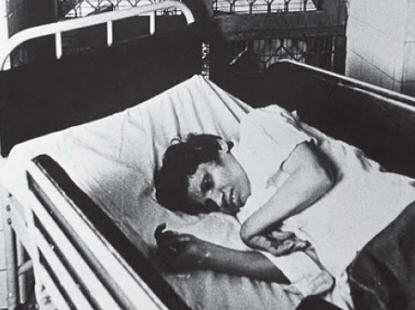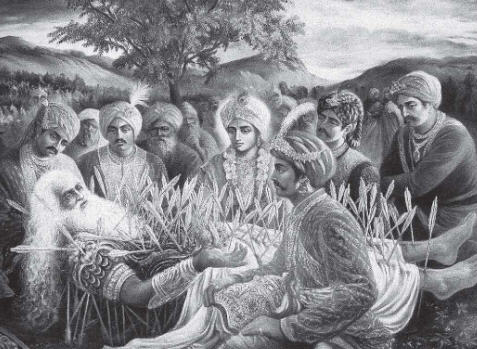
Under special or extreme circumstances, do we have the right
to take away our life or someone’s life? What is the Vedic viewpoint on this?
Aruna Shanbaug was working as a nurse at Mumbai’s KEM hospital. In 1973 a ward boy tried to violate her, but because he was unsuccessful he then tried to strangle her with a dog-chain. As her brain was starved of oxygen she became completely paralyzed and now lies in the hospital in a persistent vegetative state. She is now looked after by the nursing staff that caters to her every need.
Recently a journalist filed a petition requesting the Supreme Court to allow her to die rather than go on suffering in this way. However in a landmark verdict the Supreme Court of India pronounced that she should live. Although the Court ruled out the option of giving Aruna a so-called “merciful death,” because she still showed some emotions, they allowed “Passive Euthanasia” in cases where the patient is unable to express any kind of emotional activity whatsoever.
“Passive euthanasia” is defined as a deliberate withdrawal of medical treatment to hasten the death of a terminally ill patient who is in no position to express his or her desire. Simply put it means turning off respirators, stopping all medicines, discontinuing food and water, thus starving the patient to death or not allowing him to resuscitate. The patient’s life is terminated in a polished way thus making it appear that this is the best course of action.
This raises more questions: Who has the moral right to take a decision on someone’s behalf for administering euthanasia, passive or otherwise? What are the different factors that one must consider before taking such a decision? This article attempts to understand on the basis of the Vedas the concept of quitting one’s body for a more favorable existence.
CAN SOMEONE TERMINATE ONE’S LIFE?

Should a person be entitled to terminate one’s life? The Vedic answer is a conditional yes.
The Bhagavad-gita (Chapter Eight) describes how exceptionally qualified yogis quit their present material body even much before their appointed time of death. How do they do it? In texts 11, 12 and 13, Lord Krsna describes how to achieve the status of giving up one’s material body at a favorable moment. “Persons who are learned in the Vedas, who utter omkara and who are great sages in the renounced order, enter into Brahman. Desiring such perfection, one practices celibacy. I shall now briefly explain to you this process by which one may attain salvation. The yogic situation is that of detachment from all sensual engagements. Closing all the doors of the senses and fixing the mind on the heart and the life air at the top of the head, one establishes himself in yoga. After being situated in this yoga practice and vibrating the sacred syllable Om, the supreme combination of letters, if one thinks of the Supreme Personality of Godhead and quits his body, he will certainly reach the spiritual planets.”
The privilege of being able to quit one’s body at a chosen time is not exactly the same as “dying peacefully,” which happens in a complete ignorant state of consciousness. Most of us fear a slow, painful death or death due to being burnt alive or drowned or shot by a bullet . . . Actually, there is nothing like a “pleasant” death. No matter how it comes death is always miserable. Only great souls try to conquer death. And the best technique of conquering death is the one described by Lord Krsna in his Bhagavad-gita.
Life is a preparation, and death the final examination. What happens to the person after death? To understand this concept we have to look at a few Vedic facts:
1. We are not our material bodies. Rather we are spirit souls who are temporarily residing in these bodies. The Gita explains that just as one gives up old and useless garments and puts on new ones, a person gives up old bodies and accepts new ones.
2. The soul is more or less condemned to accept his present material status. Each and every material body has to undergo old age, disease and death once it is born. There is no escape from this cycle for anyone. Just as a condemned prisoner has to serve his sentence in prison, a living entity has to complete his tenure in that particular body. Any attempt to quit that body (due to trauma or misery) is tantamount to a prisoner trying to break away from his prison. This act, even if successful, will not mitigate his sentence, and he stands to be punished more, with the added offense of attempting to run away from the jail after being caught.
3. The law of karma decides which body one has to accept. Only in the human form of life can one choose to adjust his karmic future.
Let us study two famous historical incidents.
THE PASSING OF BHISMADEVA
Grandfather Bhisma was a statesman, the head of the Kuru dynasty and a great general and leader of the warrior class. He was a great fighter and a hero and was endowed with the unique boon of being able to choose his time of death. While fighting with Arjuna, Bhisma’s body was pierced with arrows and he lay on the battlefield awaiting an auspicious time to depart from this world. The battle was over in eighteen days, and the Panòavas emerged victorious. Lord Krsna then persuaded the Panòava brothers along with many other saintly persons to visit the dying Bhismadeva. This is how the Srimad-Bhagavatam (1.9.30) describes the glorious qualities of Bhismadeva:
“Thereupon that man who spoke on different subjects with thousands of meanings and who fought on thousands of battlefields and protected thousands of men, stopped speaking and, being completely freed from all bondage, withdrew his mind from everything else and fixed his wide-open eyes upon the original Personality of Godhead, Sri Krsna, who stood before him, four-handed, dressed in yellow garments that glittered and shined.”
As Bhisma had chosen the particular time for quitting his body he prepared himself by reciting this prayer: “May my Lord, who is four-handed and whose beautifully decorated lotus face, with eyes as red as the rising sun, is smiling, kindly await me at that moment when I quit this material body.” (Bhagavatam 1.9.24) He then merged his self into thinking of the Lord and his mind into remembering His different activities. Bhismadeva chanted the glories of Sri Krsna especially remembering Him as the beloved friend of Arjuna. Thus he quit his body and everybody around fell silent as birds at the end of the day. Both men and demigods sounded drums in honor, and the honest royal order commenced demonstrations of honor and respect. And from the sky fell showers of flowers.
DHRTARASHTRA QUITS HIS BODY

Dhrtarashtra was the father of the hundred Kauravas headed by Duryodhana. As Duryodhana schemed to wrestle the kingdom from the rightful heir Yudhisthira, Dhrtarashtra always sided with his evil-minded son. After the battle of Kurukshetra was won by the Pandavas, Dhrtarashtra remained in the palace of Yudhisthira. At that time his younger brother and counsel, Vidura, visited him. Seeing his condition, Vidura admonished him in the harshest possible language. Vidura said, “My dear King, please get out of here immediately. Do not delay. Just see how fear has overtaken you. This frightful situation cannot be remedied by any person in this material world. My lord, it is the Supreme Personality of Godhead as eternal time [kala] that has approached us all. Whoever is under the influence of supreme kala [eternal time] must surrender his most dear life, and what to speak of other things, such as wealth, honor, children, land and home. Your father, brother, well-wishers and sons are all dead and passed away. You yourself have expended the major portion of your life, your body is now overtaken by invalidity, and you are living in the home of another. You have been blind from your very birth, and recently you have become hard of hearing. Your memory is shortened, and your intelligence is disturbed. Your teeth are loose, your liver is defective, and you are coughing up mucus. Alas, how powerful are the hopes of a living being to continue his life. Verily, you are living just like a household dog and are eating remnants of food given by Bhima. There is no need to live a degraded life and subsist on the charity of those whom you tried to kill by arson and poisoning. You also insulted one of their wives and usurped their kingdom and wealth. Despite your unwillingness to die and your desire to live even at the cost of honor and prestige, your miserly body will certainly dwindle and deteriorate like an old garment.” (Bhagavatam 1.13.18–25)
For the first time in his life Dhrtarashtra took Vidura’s instructions to heart and actually took steps to implement them. The next morning unknown to anyone in the palace he left with his wife Gandhari and Vidura for the deep forest. There he began the practice of the art of quitting his body successfully. First he performed astanga-yoga, then bathed three times daily and then performed the agnihotra fire-sacrifice. Throughout this period he only drank water.
Thus he began his yoga system by drinking water only and sitting calmly in a place with a spiritual atmosphere, deeply absorbed in the thoughts of the Lord Hari, the Personality of Godhead. In a matter of days he perfected this process. After having complete success in this endeavor Dhrtarashtra was able to quit his body by his own choice of time and had the facility to attain any planet he desired by turning the present body into ashes by self-made fire.
CONCLUSION
The conditional “yes” given by the Vedas for those desiring to leave their material bodies should not be seen as a short-cut to decrease present miseries. The Vedas do NOT condone suicide in any way. However, only for those highly qualified individuals who exactly know their final destination is this facility offered. In the Gita Lord Krsna asserts jivanam sarva-bhutesu: “I am the life of all that lives.” It is Krsna who has given the particular duration of life to a living entity. Srila Prabhupada clarifies in his purport that Krsna allots the duration of man’s life. Therefore by the grace of Krsna, one can prolong one’s life or diminish it.
Syamananda Dasa serves as the editor for English and Marathi editions of BACK TO GODHEAD magazine in India.
